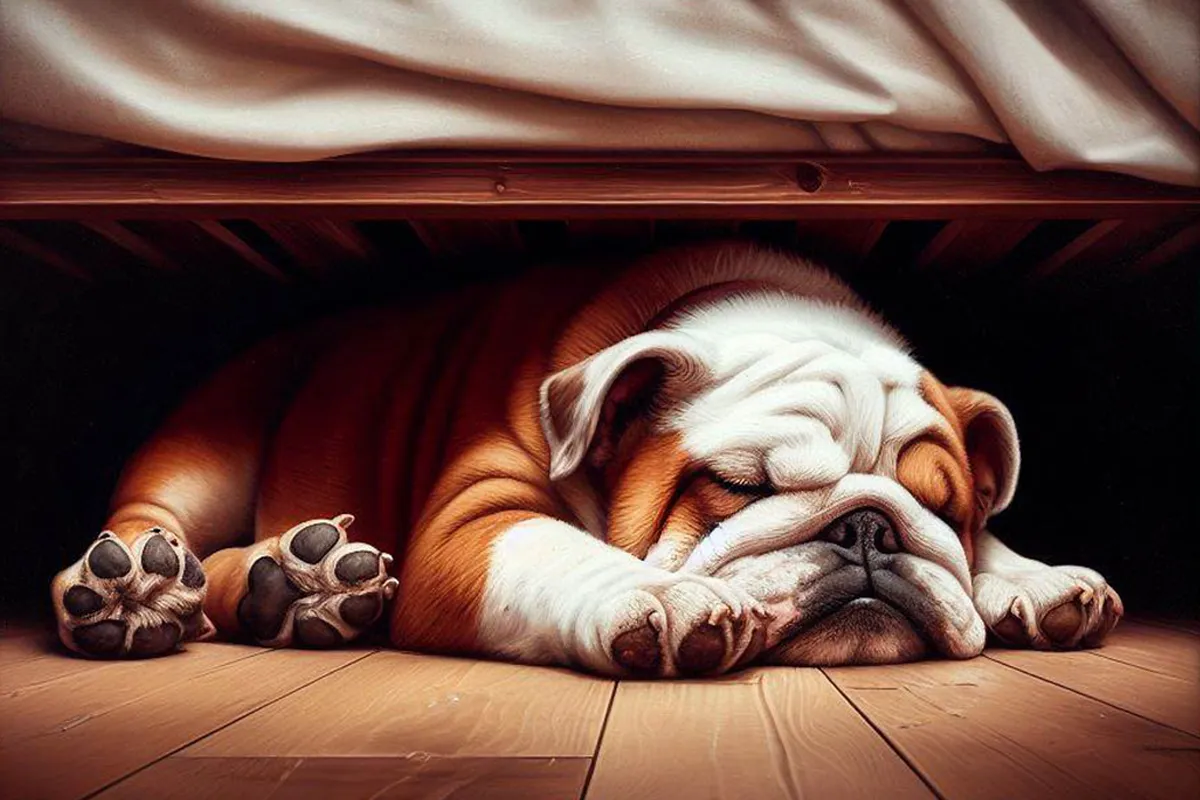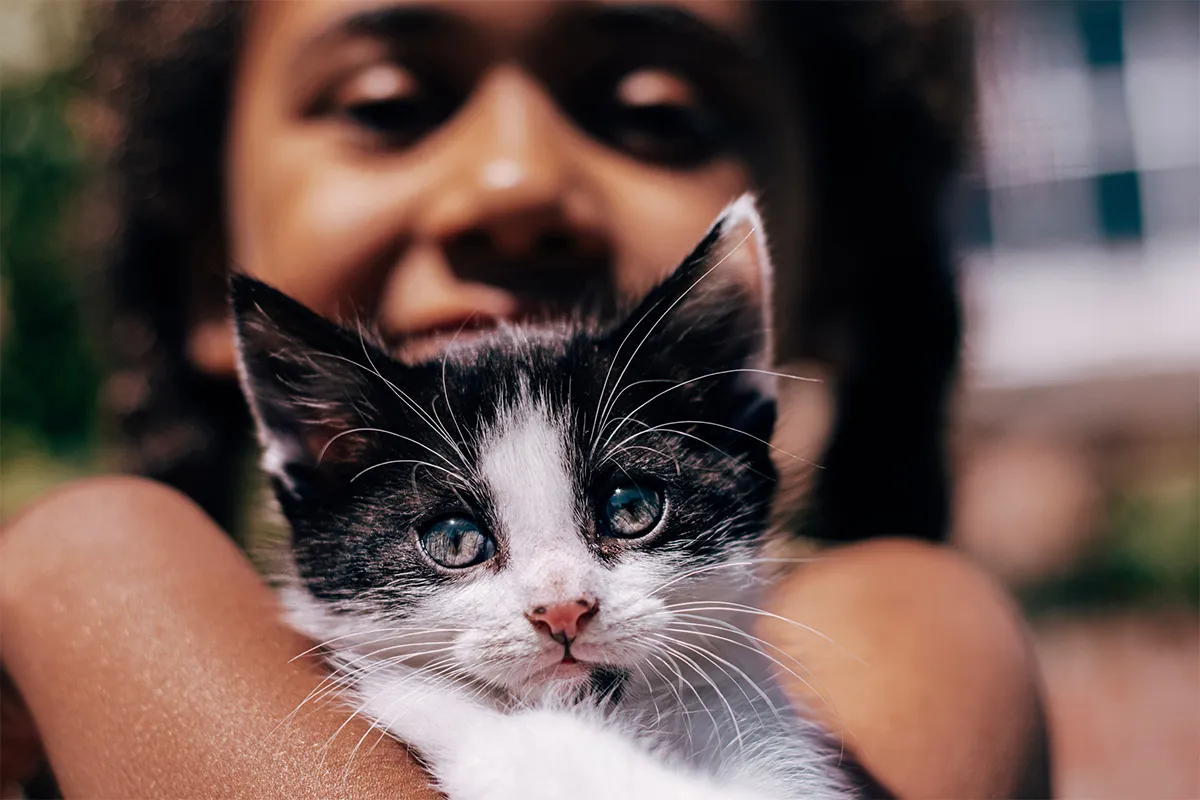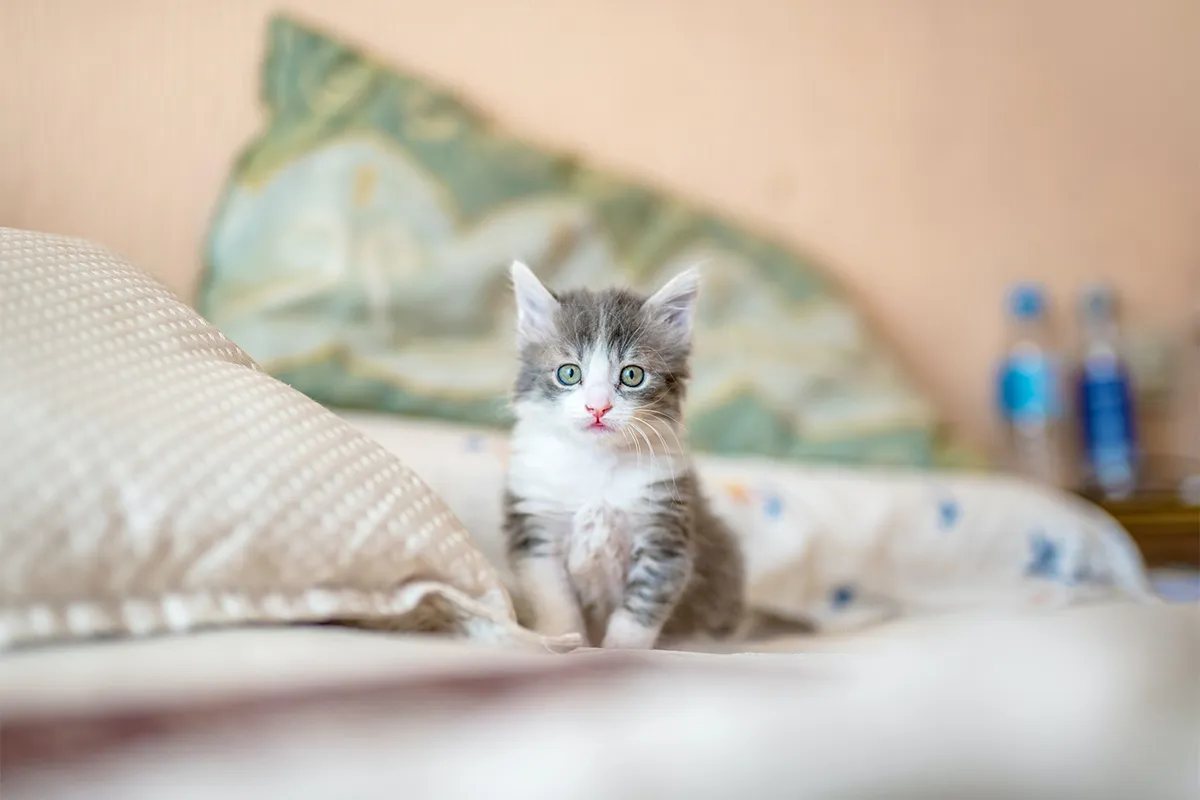Have you ever wondered why your furry companion loves to lick your face? Dogs primarily use body language to communicate with others and express their emotions, including the affection they feel for their human family. However, these displays of canine affection, often referred to as “love licks,” can seem peculiar or even unhygienic to some. So, if you find yourself pondering, “Why does my dog lick my face?” and you’re unsure about this behavior or worried about potential germs, keep reading to uncover the reasons behind it.
Table of Contents:
- Your Dog Licks You Because They Love You
- Dogs Learn to Lick from Birth
- Seeking Attention
- Calming Behavior
- Stress as a Trigger
- Traumas or Phobias
- Conclusion
Your Dog Licks You Because They Love You
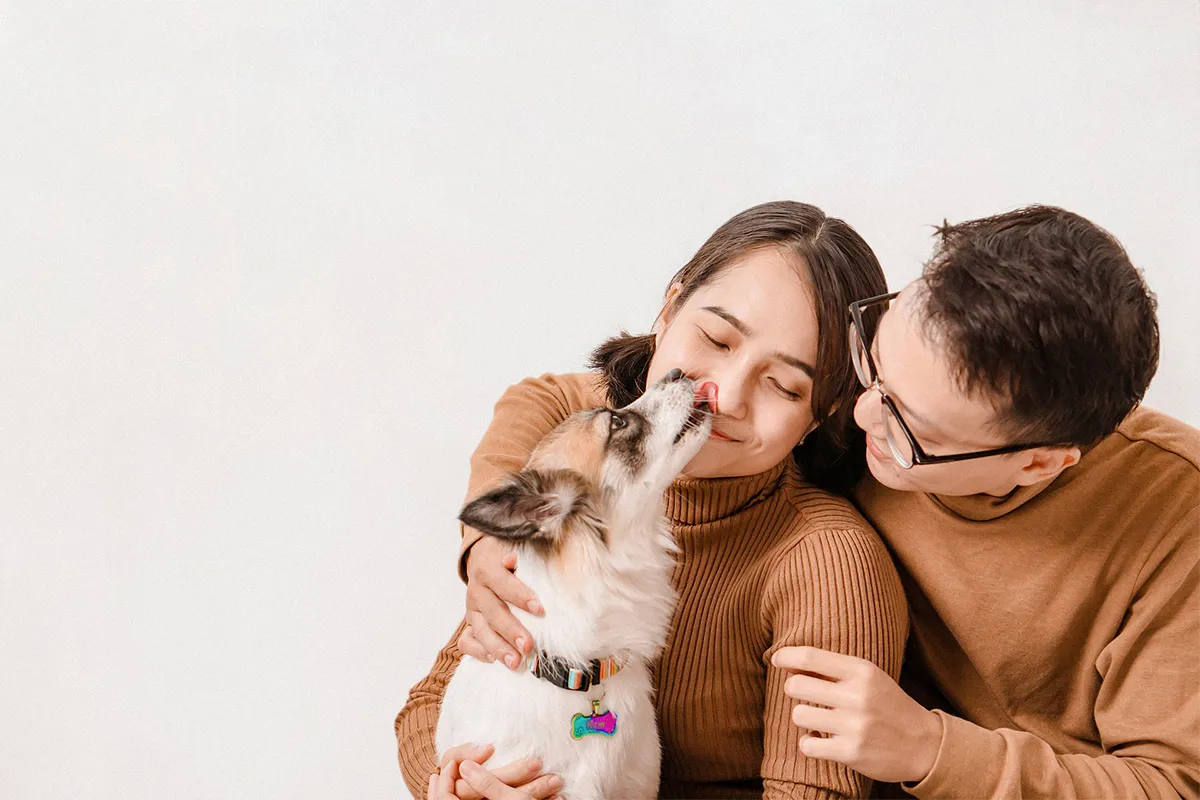
In most cases, the primary reason behind dogs licking their owner’s face, hands, or feet is to express their affection. This behavior is deeply ingrained in their nature and can be traced back to the habits of wolves, particularly wolf pups, related to hunting.
In a wolf pack, adult members venture out for hunting, often covering long distances to find prey. After a successful hunt, they consume as much food as possible, and their stomachs can expand significantly, serving as a temporary food storage. This behavior plays a vital role in providing for wolf pups, as the repeated licking prompts adult wolves to regurgitate the excess food they had consumed during the hunt, which is essential for nourishing their offspring.
Now, translating this behavior to dogs, who have undergone a long process of domestication, we can interpret the habit of licking their owner’s face as a demonstration of respect, affection, and submission. When we talk about submission, it means that your dog licks you to seek approval and even express gratitude because they recognize you as the leader of their social group, their reference, and the provider of essential food, resources, and care. You are their favorite person!
Dogs Learn to Lick from Birth
This interpretation gains more strength when we consider that one of the first interactions a mother dog has with her puppies involves licking them immediately after birth to clean and ensure their well-being. Throughout a puppy’s early life, especially during the weaning stage, a mother’s licks are crucial for instilling a sense of calm and security, aiding in urination and defecation, and facilitating their exploration of the world.
When not done excessively or obsessively, this behavior is entirely natural and is directed toward people who make dogs feel happy and secure, especially their owners and family members. Therefore, it is not recommended to reprimand or punish your dog to discourage this behavior as it goes against their natural instincts and can harm the bond with your furry companion.
If you are concerned about the possibility of contracting diseases, the key to prevention lies in providing your dog with all the necessary vaccinations and parasite control, both internal and external. Additionally, maintaining excellent oral hygiene and offering a diet that meets their nutritional needs is crucial. When both you and your dog are healthy, the risk of disease from the microorganisms naturally present in their mouth is low. Nevertheless, there are ways to reduce the frequency of this behavior, such as not reinforcing it and redirecting your dog’s attention to a different activity whenever they try to lick you.
Seeking Attention
Another reason dogs lick their owner’s face is to get their attention. You may have noticed that it’s challenging to ignore your dog while they’re showering you with licks. If you wonder, “Why does my dog wake me up by licking my face?” the most likely answer is that they need something from you. It’s up to you to identify why your dog is seeking your attention through their persistent licking.
Most of the time, your dog will try to obtain the basics for their physical and psychological well-being, such as food and water, walks, playtime, affection, and companionship. However, there may be instances where your furry friend is feeling unwell and is using licking as a means to alert you. In such cases, you may observe signs of pain or other indications that your dog is unwell, along with changes in their behavior, such as increased nervousness or lethargy. In these situations, it’s crucial to promptly take your dog to the veterinarian for a health evaluation and potential treatment.
Calming Behavior
Licking is one of the primary calming signals that dogs use in various situations that cause discomfort, fear, anxiety, stress, and more. Dogs employ these signals not only to communicate with each other but also with other animals and people. They do so with the intention of pacifying a situation they perceive as unfavorable or potentially dangerous, such as a conflict with another dog or their owner.
A dog may combine several calming signals to convey their intentions, generally sending a message like “I don’t want trouble” or “This makes me uncomfortable/nervous, please stop.” Unfortunately, many dog owners lack basic knowledge of canine body language and communication cues, which can lead to them inadvertently engaging in actions that stress their dogs. This can inadvertently become a challenge to the dog’s natural communication.
For example, if you insist on hugging your dog, maintain direct eye contact, or reprimand them incorrectly, your dog may exhibit various calming signals to convey that they didn’t mean to upset you and wish to avoid conflict. In these contexts, you may observe your dog licking their nose or licking your hands or face while holding their head low and ears back—all of which are calming signals meant to ease your concerns.
If you’re wondering why dogs lick their owner’s faces, it’s essential to study canine body language to enhance communication with your furry friend and quickly recognize calming signals. It’s also vital to review your behavior and training techniques to avoid improper use of reprimands and other unsuitable and unsafe methods, such as physical punishments and confinement, opting instead for positive reinforcement to encourage learning.
Stress as a Trigger
The calming signals mentioned above become more pronounced when a dog is in a stressful environment or undergoing a series of stressful situations. Apart from communication breakdowns with their owners, numerous other sources of stress can affect a dog’s behavior. These sources may include sudden changes in their environment or routine, moving to a new home, frequent exposure to excessive stimuli (e.g., loud noises), a sedentary lifestyle with low physical activity, an unstimulating environment, or underlying health issues.
In such cases, it’s important to recognize the primary stress symptoms in dogs. Upon identifying these signs in your dog, we recommend consulting a veterinarian to rule out any underlying medical conditions. Once medical issues are ruled out, you should evaluate the frequency and duration of walks and invest in environmental enrichment for your dog.
If your dog is struggling to adapt to a new home and displays overly anxious or nervous behavior, consult a veterinarian about the benefits and drawbacks of using synthetic pheromones (note that they may not be suitable for all dogs and should be evaluated by a qualified professional). Another safer alternative could be natural remedies to relieve stress in dogs, though it’s always advised to consult a veterinarian for safety.
Traumas or Phobias
This brings us to the fifth reason why dogs lick their owner’s faces. When a dog has experienced a series of negative experiences, especially those involving abandonment and various forms of mistreatment, they are more likely to develop trauma or even phobias. Although these are distinct conditions with different manifestations, both can lead to the repetitive or obsessive behavior of licking themselves or their owners.
If you’ve recently adopted a dog and notice this pattern of obsessive behavior, it’s possible that your new companion has been a victim of physical and/or emotional violence. However, other potential causes include deficient or non-existent socialization, chronic stress, a sedentary lifestyle with low mental stimulation, and extended periods of confinement.
In these cases, the best approach to help your furry friend is to consult a veterinarian with expertise in canine ethology or a dog trainer experienced in such cases. Many dogs with phobias or traumas will require several behavior modification sessions and may even need to be “re-educated” and “re-socialized” to overcome their insecurities, regain their confidence, and learn to express themselves through healthy behaviors.
This is a long process where your dog will need your patience and affection more than ever. Don’t give up on them, as they wouldn’t give up on you!
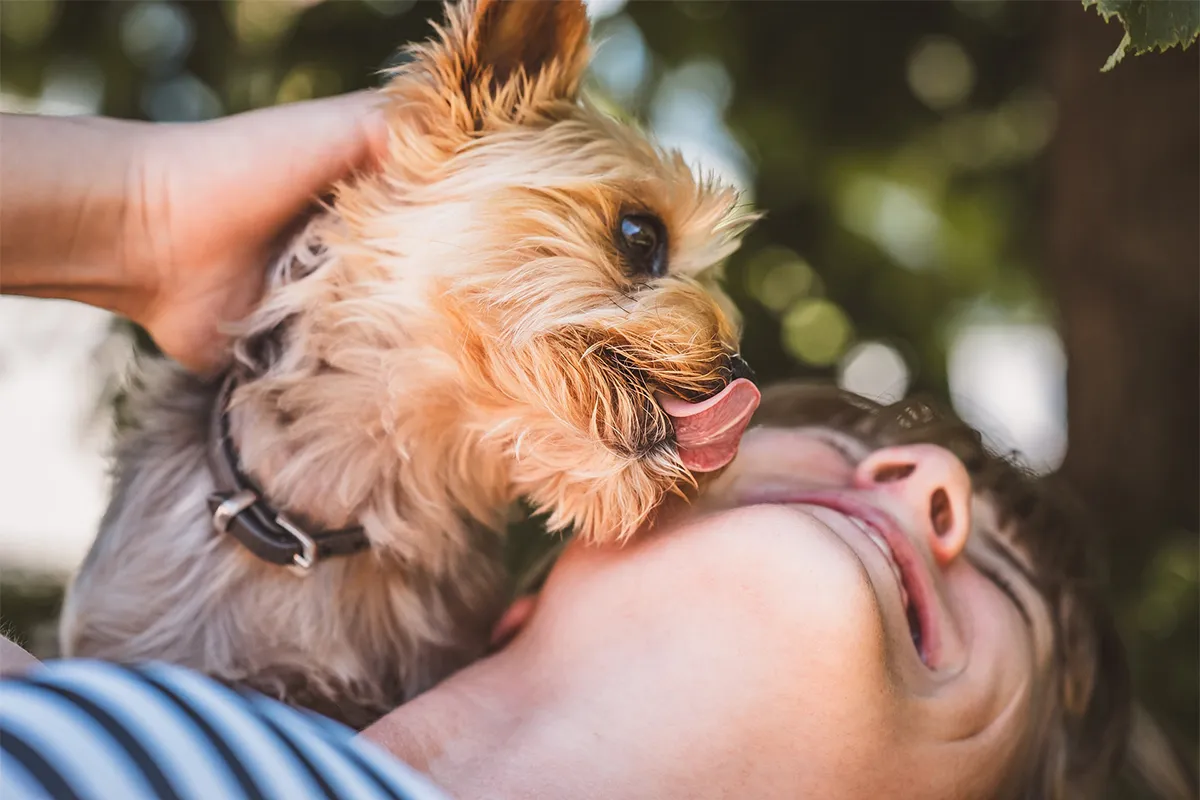
Conclusion
In conclusion, dogs licking their owner’s face is a complex behavior with various underlying reasons. While it can be a sign of affection and love, it can also serve as a means of communication, a call for attention, a way to alleviate stress, or even a response to past traumas or phobias. Understanding the motivations behind this behavior is essential to strengthen your bond with your dog and ensure their physical and mental well-being.
By interpreting your dog’s licks and responding appropriately, you can maintain a healthy and harmonious relationship with your furry companion. Remember, they are not just our pets; they are our faithful friends who rely on us for love, care, and understanding.
Incorporating the knowledge of your dog’s body language and behavior can improve your communication and enhance the quality of your relationship. So, the next time you wonder, “Why does my dog lick my face?” you’ll have a deeper understanding of their unique way of expressing themselves.
Now you know why your dog licks your face and how to respond to it. Whether it’s out of love, a desire for attention, or a sign of stress, your furry friend is trying to convey something important to you.
End your confusion and strengthen your bond with your loyal companion today!
